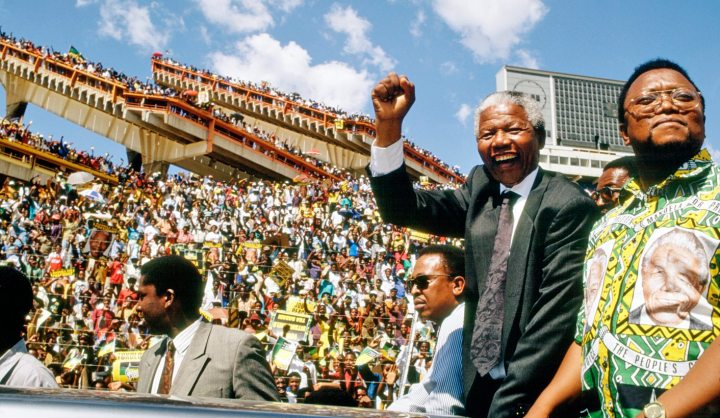South Africa
Analysis: Civil activism & Mandela Day ideals

Thursday marks another Mandela Day and with it will come a mass partaking in deeds to promote a global movement for change. But looking at Nelson Mandela and his comrades’ values, GREG NICOLSON wonders about the state of activism and civil participation in South Africa, hoping that we can go beyond random deeds and start organising on issues of real concern.
It’s fitting that as the country celebrates former president Nelson Mandela’s birthday this week, we remember the events of July 1963. Last week marked 50 years since Apartheid police raided Arthur Goldreich’s Liliesleaf Farm and subsequently charged many ANC leaders with sabotage. Among those who were nabbed include the struggle heroes venerated, if sometimes left in Mandela’s shadow, today – Walter Sisulu, Govan Mbeki, Raymond Mhlaba, Andrew Mlangeni, Ahmed Kathrada, Denis Goldberg, Lionel Bernstein, and Harold Wolpe, to name a few.
The political activism of the ANC and other anti-Apartheid movements defines the country’s proud history of Struggle – fighting against oppression for equality and the benefit of all South Africans. It is something that’s hard to grasp in the democratic era. There’s no shortage of things to struggle for or against, but too often they seem just an inconvenience in the race to accumulate wealth, climb the class ladder, show off what you’ve earned, or tether yourself to the elite to ensure you’re not going backwards.
We’re often told that rather than blaming corrupt and unaccountable politicians, the only way the country can move forward is through increased civil engagement, community participation, and social activism. It’s hard to measure just how much time is put towards helping others or engaging in community issues. The 2005 State of Giving report found that helping others was ingrained in South African society, with 93% of respondents offering time, money, or goods to a cause or individual in the month before the survey. The report included many of the acts other surveys might neglect. The World Giving Index puts South Africa at 70 in its world ranking, finding 15% of the population donate money, 19% volunteer, and 55% have helped a stranger. A 2011 Stats SA survey found 3.5% of the working age population volunteer.
It’s common, however, to hear that activism and civil engagement have broken down since the Struggle days. In an insightful post, activist Charlene Houston wrote last year, “Many youth have not followed the old trajectory from grassroots or student activist to NGO campaigner. Instead they are more likely to take up opportunities provided by the online revolution. Today there are many fast-fingered Facebook activists that will likely never do more than sign an online petition. These people also need to find ways to connect with communities where change is long overdue and where justice has been slow to arrive.” One of the key causes of activism’s decline, she said, has been its move from a public activity to one dominated by NGOs, which face funding challenges and whose employees often move to government or corporate jobs.
Speaking at Daily Maverick’s 2012 Gathering event, Jay Naidoo, founding general secretary of Cosatu and chair of the Global Alliance for Improved Nutrition, said we have forgotten how to build local organisations to change issues. Writing on the 1976 uprising, Naidoo commented, “It forced us to turn our attention to the painstaking challenge of building organisations in our communities, in the factories and mines, in schools, amongst youth, women, and faith-based groups. Each person became a leader. I believe we need to return to those simple ideals.”
Mandela’s ill health and the anniversary of the Liliesleaf raid bring a renewed focus on the ideals of the Struggle icons. They were united in believing that organisation and civic engagement were crucial to facing the country’s problems. Many brilliant organisations, too many and too varied to mention in detail, offer an opportunity to continue those ideals, but there is still a lack of engagement.
Apartheid has been defeated, but many challenges remain. Inequality, inadequate living conditions, unemployment, gender-based violence, corruption, pollution, potholes, poor public transport, infant mortality, drug stock outs, deaths at initiation schools, police brutality – take your pick. Democracy requires constant civic participation and the spirit of association. Whether it’s these issues or others concerning the country’s trajectory that concerns citizens, engaging with them requires a level of organisation beyond service delivery protests.
“Make every day a Mandela Day” is the tagline for the 18 July event. The Mandela Day organisers encourage participants to perform a deed that offers “service to one’s fellow human” and honours the former president’s devotion to justice and freedom. Sixty-seven acts are offered as suggestions, including making a new friend, helping a business off the ground, donating a wheelchair, volunteering at a school or soup kitchen, treasuring the elderly, and mentoring someone.
There’s no shortage of reasons to get involved in whatever way possible. But as we remember those who have shaped South Africa, we must remember they didn’t simply perform just random acts of kindness. They were committed to engaging with the causes they thought were important and worked with organisations, over years and decades, to reach their goals. DM
Photo: Nelson Mandela, on the campaign trail in 1994. (Greg Marinovich)


















 Become an Insider
Become an Insider